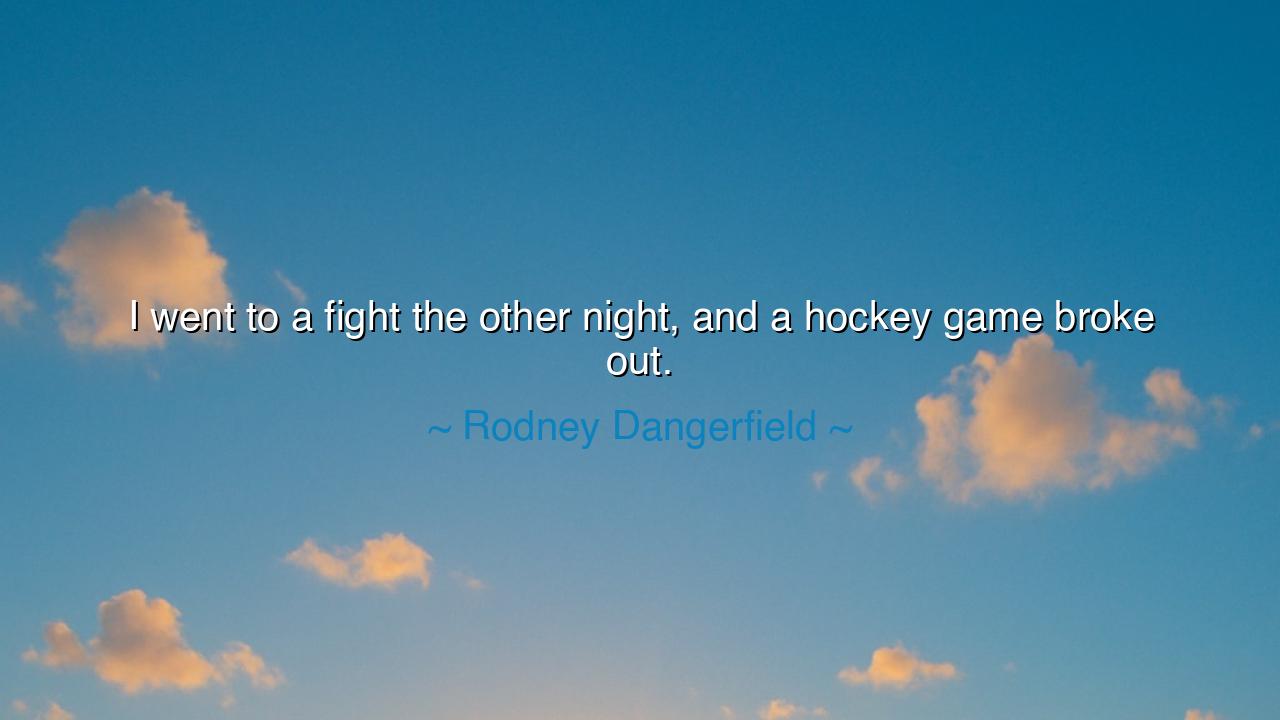
I went to a fight the other night, and a hockey game broke out.






Hearken, O seeker of wisdom, to the words of Rodney Dangerfield, the master of wit and keen observer of human folly, who jested: “I went to a fight the other night, and a hockey game broke out.” Though spoken with humor, these words contain a meditation upon chaos, expectation, and the unpredictable nature of life. Dangerfield reminds us that events often defy anticipation, and that human experience is rarely neat or confined to the boundaries we imagine.
Since the earliest contests among men, mortals have known that preparation and expectation do not guarantee outcome. The arenas of Sparta, the theaters of Athens, and the Roman amphitheaters all witnessed spectacles that erupted beyond prediction. Dangerfield’s quip captures this timeless truth: life, like sport, may erupt into chaos, turning intention into unforeseen circumstance. In humor, he teaches the wisdom of perspective: to expect the orderly is to court surprise, and to adapt is to endure with grace.
In the realm of sport, this truth is literal and symbolic. A fight, intended to be contained, can escalate beyond control, transforming into a spectacle unimagined by participants or spectators alike. Dangerfield’s metaphor illustrates that human endeavors are subject to forces beyond our planning. What we perceive as certain—the orderly contest—may dissolve into disruption, surprise, and the unpredictable flow of events.
Consider the story of Julius Caesar crossing the Rubicon. Though he intended decisive action, the consequences of that act erupted beyond expectation, igniting civil war and reshaping the Roman world. Dangerfield’s humor mirrors this ancient lesson: one must recognize that even deliberate acts may provoke unforeseen chaos, and that readiness for the unexpected is as vital as skill in execution.
The ancients also revered the virtue of adaptability. Sun Tzu, in his Art of War, wrote that the wise warrior anticipates the unpredictable, moves with flexibility, and embraces the fluidity of circumstance. Dangerfield’s jest captures this principle in modern form: humor and perspective are tools to navigate the unpredictable eruption of events that defy expectation and challenge composure.
Yet there is also a lesson in humility. To witness the transformation of a simple fight into a full-scale hockey brawl is to recognize the limits of control, the impermanence of order, and the folly of rigid expectation. Dangerfield’s words invite us to embrace surprise, cultivate humor, and maintain equanimity in the face of disorder. In laughter, we discover resilience, and in acknowledgment of chaos, wisdom.
The teaching, therefore, is clear: anticipate the unpredictable, remain flexible, and cultivate perspective through humor. Practical actions follow: observe without rigid expectation, adapt to unfolding events, maintain composure amid disorder, and seek lessons in even the most chaotic moments. By doing so, life’s disruptions become opportunities for insight rather than sources of despair.
Walk forward, O listener, as Dangerfield strode into the fray, eyes alert, spirit lightened by humor, heart prepared for unpredictability. Let his words echo through your life: I went to a fight the other night, and a hockey game broke out. In this jest lies eternal wisdom: the world is rarely orderly, expectation is often defeated, and it is through humor, flexibility, and perception that one navigates the ever-changing arena of life.






AAdministratorAdministrator
Welcome, honored guests. Please leave a comment, we will respond soon